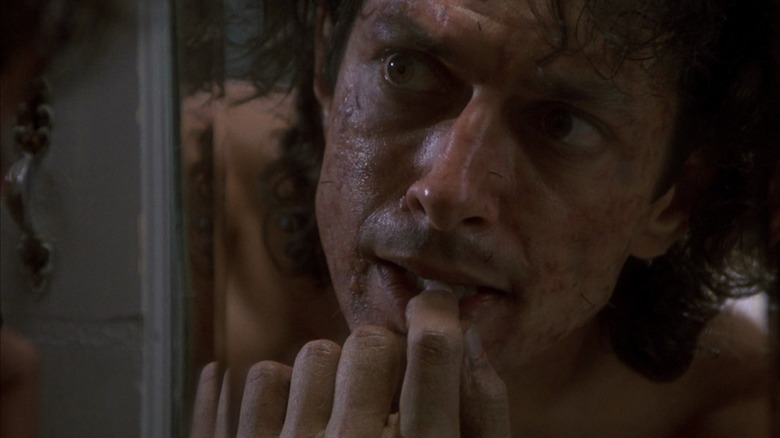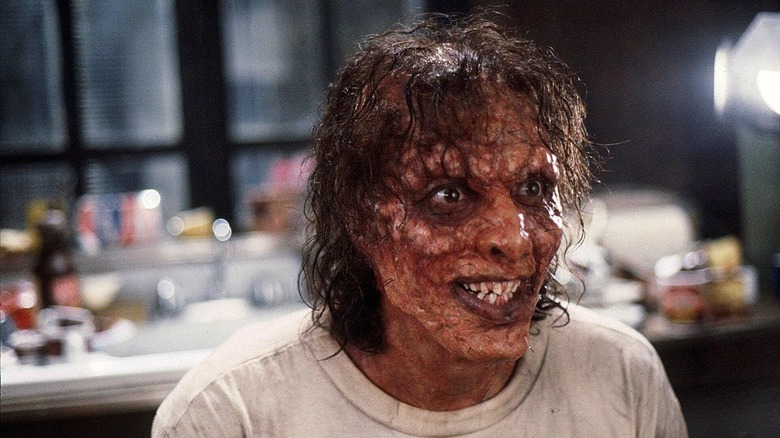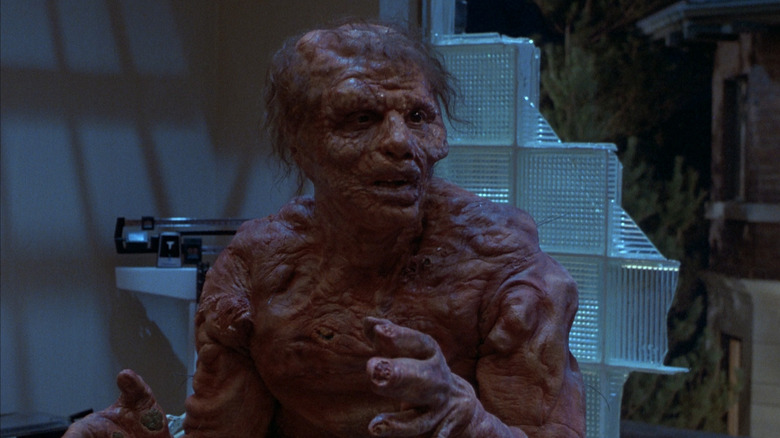David Cronenberg Sees A Deeper Meaning Behind His Body Horror
David Cronenberg's most recent film "Crime of the Future" takes place only a few decades (perhaps) from the present, when human beings have eradicated physical pain from their experience, and surgery has become a form of performance art. The film's protagonist is afflicted with a medical condition that causes random, unidentified internal organs to spontaneously grow in his body, leading his performance partner to artfully remove them in front of a crowd. Many critics (including /Film's own Chris Evangelista) noted that "Crimes" was a return to the body horror the filmmaker had been known for — but had been casually ignoring for the last 20 years of his career.
While Cronenberg has always been associated with the term "body horror," it is a term he personally eschews. In a recent interview with Entertainment Weekly, Cronenberg pointed out that the term was bandied about by his fans and by critics, but was not something he internalized or even thinks about. He is interested in the stories he is interested in, full stop. Genre doesn't concern him as much as the technicals of making a film "work" in his own milieu.
Way back in 1987, after Cronenberg had just completed his high-profile studio horror remake "The Fly," he was already skirting around calling his films "body horror," correcting a notion that his movies have a deep-seated aversion to the juicy workings of the human body. This is something the filmmaker confirmed in an interview with Time Out Magazine, handily archived by a blog called Multiglom.
The Fly
The 1986 remake of "The Fly" is about a scientist (Jeff Goldblum) who is in the middle of perfecting a teleportation pod. When a fly gets trapped in a pod with him, the machine innocently splices them together. Goldblum spends the bulk of the film watching his body slowly transform into a monstrous fly-human hybrid. Pieces drop off his body and his skin warps, he spits out teeth, he loses an ear. His emotional journey is complex, as his horror quickly turns to fascination. He begins making records and videos of his transformation and deterioration.
This scientific fascination stems from Cronenberg's own interests in regards to human bodies, and would still be true 36 years later with "Crimes of the Future." In the Time Out interview, Cronenberg even suggested something that would be joked about, in dialogue, in "Crimes":
"It's a fascination with the human body. But it's also a willingness to look at what's there without flinching, and to say: 'This is what we're made of, as disgusting as it might seem at times.' Because I'm really saying that the inside of the human body must have a completely different aesthetic. I could conceive of a beauty contest where people would unzip themselves and show you the best spleen and the best-looking viscera."
Viggo Mortensen's "Crimes" character makes cracks about an "inner beauty pageant." Cronenberg has been flip, casual, and fascinated with human biology for decades. To him, it's not necessarily horrific. It's just life. It also stems from a rather personal experience he had with bodily deterioration.
Disease
Cronenberg's father, Milton, owned a bookstore and occasionally wrote for the Toronto Telegraph when the filmmaker was a boy. In the 1970s, Milton contracted a condition that was initially diagnosed as colitis, but grew into an inability to process calcium. The condition weakened his bones, and they would break with the slightest pressure. Milton Cronenberg died at the age of 61, his body having betrayed him. Cronenberg has been frank about the fact that watching his father's body become altered by disease was a large part of "The Fly."
"People who have a disease, who are in terrible shape, they have moments of humor and total self-awareness, and I wanted the character of [Goldblum's] Brundle to be real that way."
Cronenberg even once corrected an interpretation of "The Fly" in an interview with the New York Times Magazine, setting the record straight that it was not meant to be a film about AIDS but about getting older. Which is, in itself, a fear of our own mortality.
"To me, the film is a metaphor for aging. It's a compression of any love affair that goes to the end of one of the lovers' lives. We've all got the disease — the disease of being finite. Death is the basis of all horror."
It's worth noting that Cronenberg is a staunch atheist, and has no supernatural or religious leanings when it comes to the self. The body is where life begins and ends, and tinkering through our inner workings is a way to explore the more profound fabric of life. When all we have is bodies, how do we connect. Cronenberg, 79, has spent his whole career exploring this.


